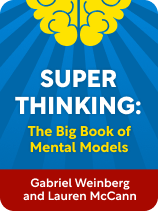

This article is an excerpt from the Shortform book guide to "Super Thinking: The Big Book of Mental Models" by Gabriel Weinberg and Lauren McCann. Shortform has the world's best summaries and analyses of books you should be reading.
Like this article? Sign up for a free trial here.
Do you take forever to make a decision? How do you stop overthinking and learn to make decisions more efficiently?
Making the best decision is pointless if it takes an impractical amount of time. In their book Super Thinking: The Big Book of Mental Models, Weinberg and McCann recommend three strategies for efficient decision-making.
Below, we’ll examine each one.
1. Identify Your North Star
The first step in efficient decision-making is to orient yourself. Before approaching specific decisions, identify your north star, your overarching goal or vision. When you orient decisions toward your north star, your abilities compound and you become more efficient at pursuing your goals.
(Shortform note: Weinberg and McCann don’t offer actionable advice for finding your north star. However, Simon Sinek’s Start With Why provides a strategy: Step back and reflect on your motivations for your actions. This might involve asking, “What do I particularly enjoy about my job?” For example, if you own a bakery, you reflect and realize that baking serves your larger goal—bringing your community together in a warm environment.)
2. Perform Deep Work
After identifying your north star, perform deep work, a concept from Cal Newport’s book, Deep Work. This involves spending extended periods of time dedicated to one important task, free of distractions and interruptions. In the long run, performing deep work will yield greater returns than juggling various tasks at once.
(Shortform note: Weinberg and McCann discuss deep work as an alternative to multitasking, which diffuses your concentration across various activities. However, Newport clarifies that deep work is also an alternative to task-switching, where you frequently shift gears from one task to another. Because mental residue from the previous task takes several minutes to overcome, Newport argues that task-switching also inhibits efficiency.)
3. Perform High-Leverage Activities
Finally, perform high-leverage activities to get more out of your decisions. In physics, a lever allows you to lift heavier objects than you could on your own. Similarly, high-leverage decisions create oversized results from less effort.
(Shortform note: In certain contexts, the term “leverage” has a negative connotation, as it involves exploiting an advantage to get what you want. For example, a corrupt politician might leverage their influence to get unpopular bills passed. Alternatively, in The Great Mental Models Volume 2, Shane Parrish and Rhiannon Beaubien argue that leverage can be an extension of reciprocity. In other words, leverage allows you to offer others the best exchange for your services, which benefits all parties.)

———End of Preview———
Like what you just read? Read the rest of the world's best book summary and analysis of Gabriel Weinberg and Lauren McCann's "Super Thinking: The Big Book of Mental Models" at Shortform.
Here's what you'll find in our full Super Thinking: The Big Book of Mental Models summary:
- How to elevate your everyday reasoning and decision-making skills
- Why you shouldn't rely on intuition when making decisions
- How to deter you opposition from engaging in conflict






